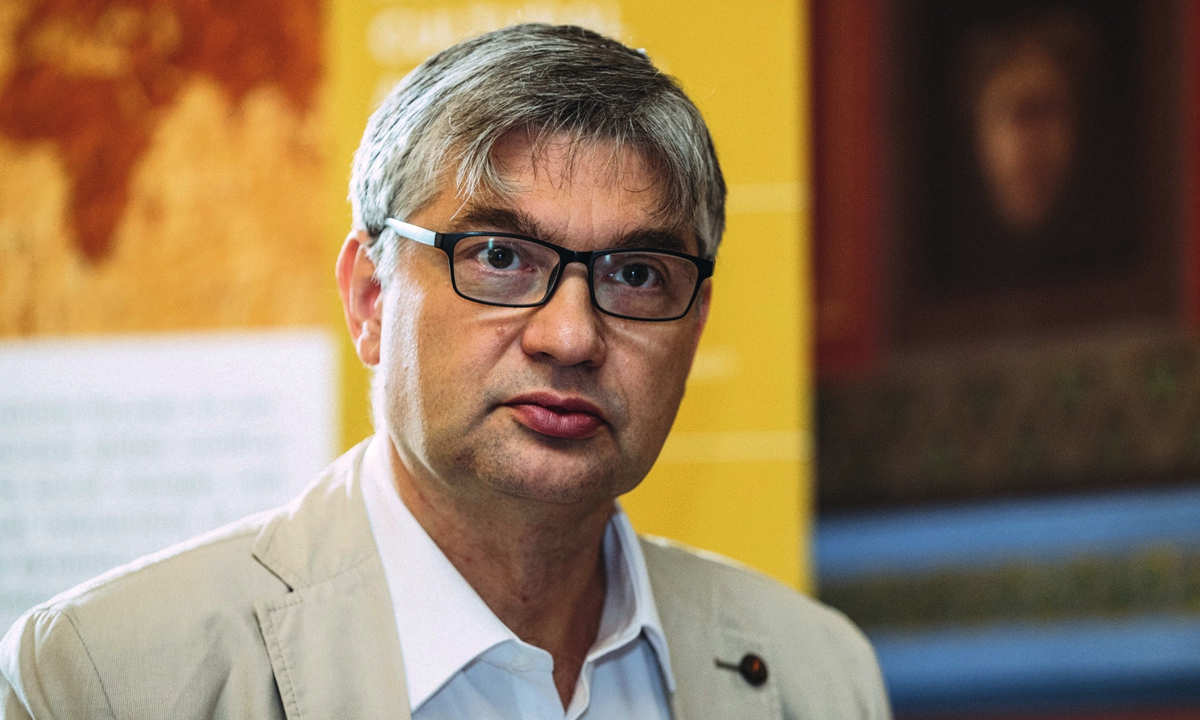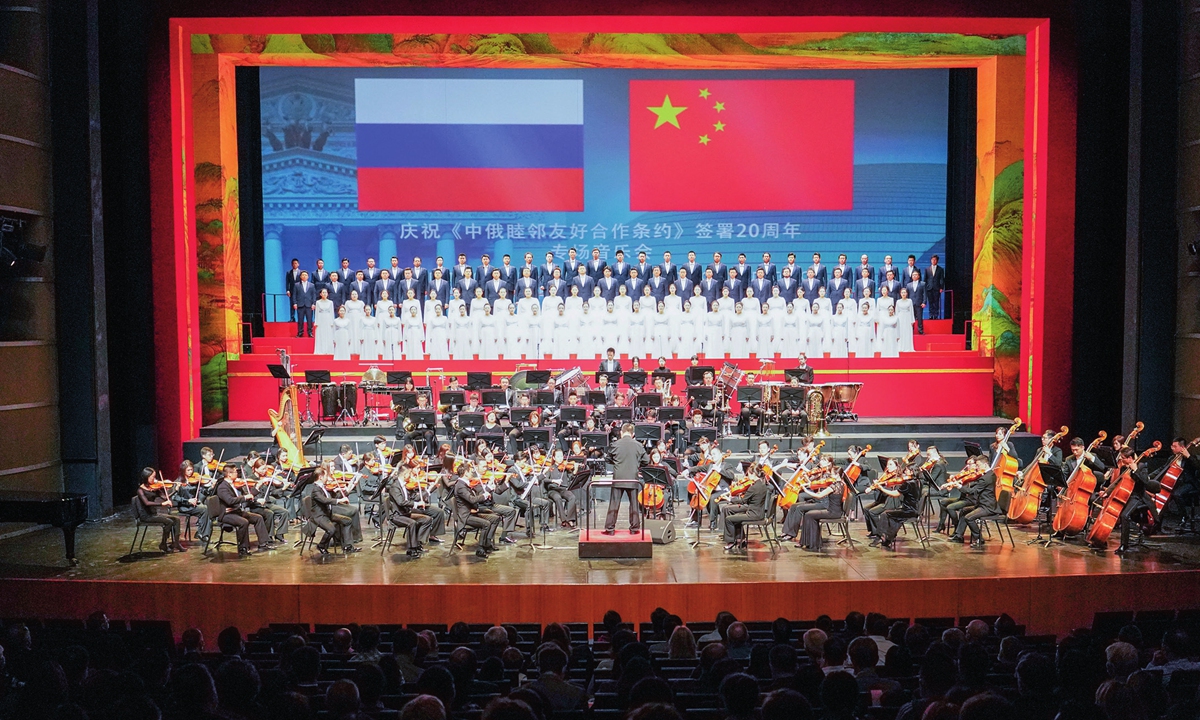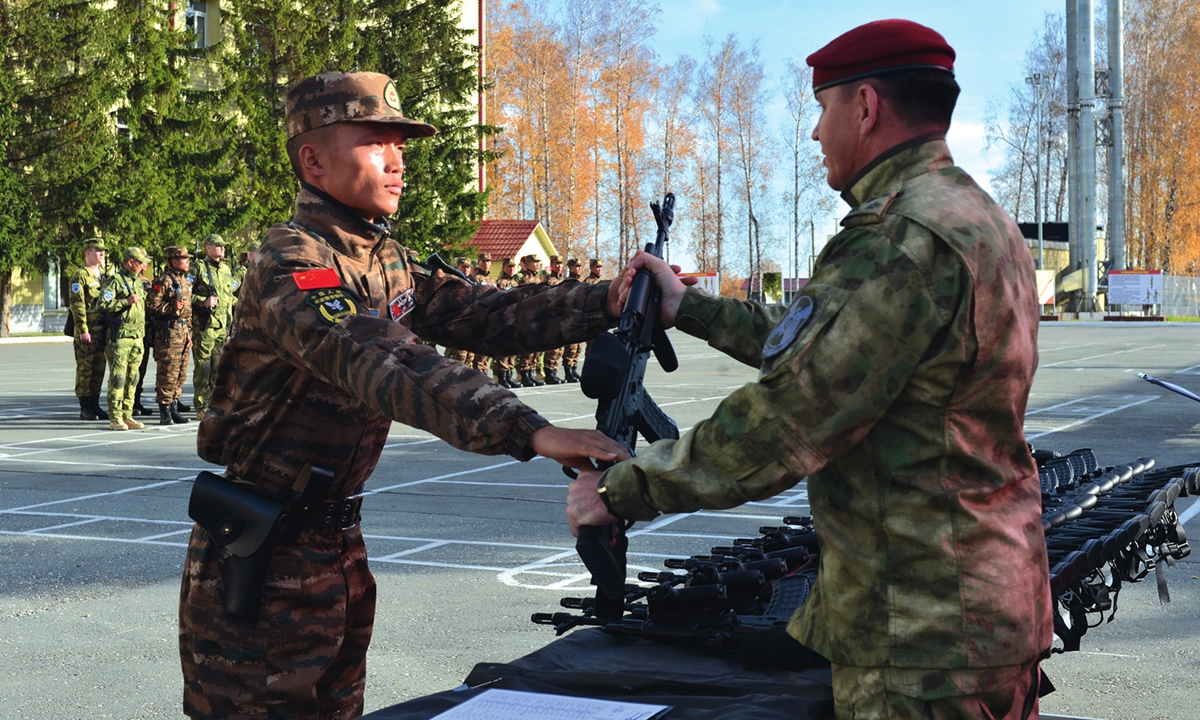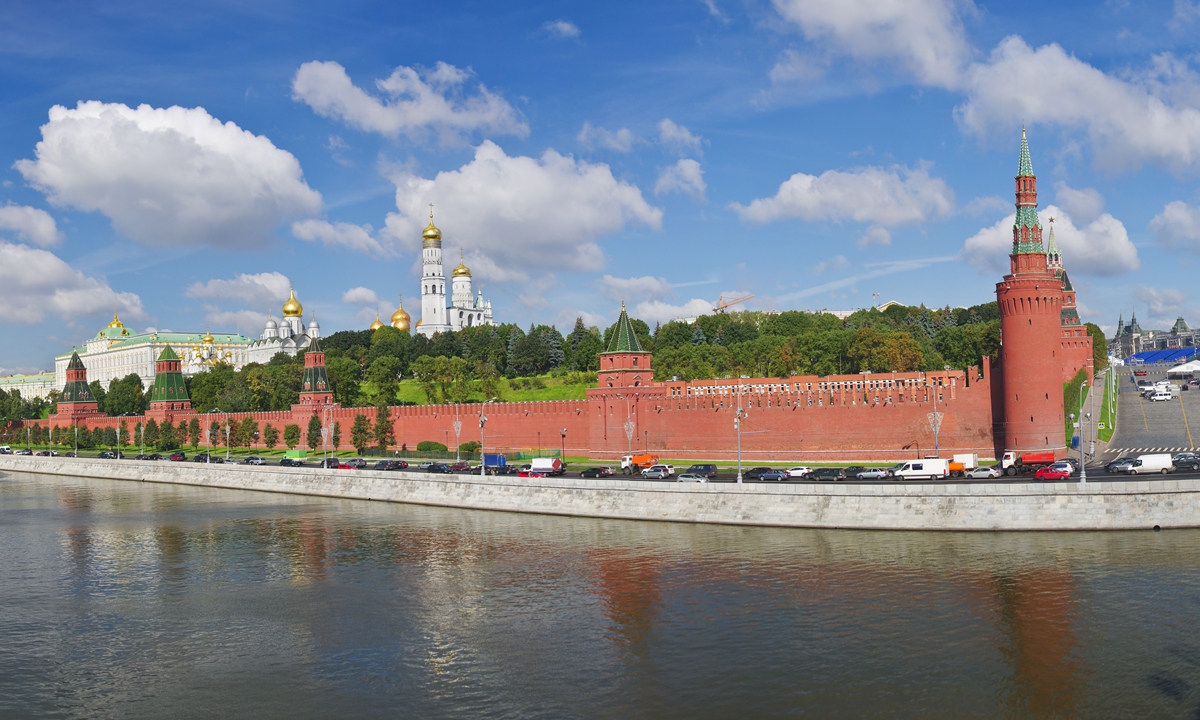Editor's Note: This year marks the 20th anniversary of the signing of the China-Russia Good-Neighborliness and Friendly Cooperation Treaty. China and Russia have since witnessed stronger ties especially given the US' continued pursuit of ideological confrontation in the world. The two sides decided to extend the treaty on June 28. How will the trilateral relations among China, Russia, and the US develop and shape the world? Global Times reporters Xie Wenting and Bai Yunyi (GT) interviewed Professor Alexander Lukin (Lukin), head of the Department of International Relations at the Higher School of Economics and director of the Center for East Asian and SCO Studies at the Moscow State Institute of International Relations.

Alexander Lukin
GT: How do you assess the likelihood of a war or military conflict between China and the US in the next 10 or 20 years? If that happens, what position do you think Russia will take?Lukin: I don't think a war is possible. I believe all sides understand this. A war will be a terrible catastrophe with no winner, because it's hard to imagine what can be called a victory. The two countries are too big and they have nuclear weapons.
But a minor military incident is possible, which can escalate into a larger clash. For example, we have already seen some incidents between ships from the two sides in the South China Sea. It may happen around Taiwan, for example, but I don't think it will.
I don't know what Russia is going to do if a war between China and the US breaks out in 20 or 30 years, because we in Russia don't think that far into the future. But if it happens in the foreseeable future, then Russia would probably support China, because Russia is China's strategic partner. In the case of a minor incident, it will be ideological support, because China would not need military support. Russia will then be morally on the side of China.
China would not need military support in case of a minor incident. China would probably even be against such support from any third party because China is a proud country that can solve its own problems. But it would need a kind of ideological support and coordination of foreign policy.
GT: Russian Foreign Minister Sergei Lavrov visited China after the China-US meeting in Anchorage, while China's top diplomat, Yang Jiechi, visited Moscow after a Russia-US foreign ministers' meeting. What signal did this send? Are Russia and China coordinating their position on the US?
Lukin: I'm quite sure that they are coordinating positions on the US. Russia and China coordinate their positions on many issues. This is a part of many agreements that the two sides have reached and they need such coordination. Specifically why they did it before or after their meetings with the Americans is because Russia and China have become strategic partners. When experts talk about the triangular relations between the three countries, there has always been an apprehension that if one side of the triangle comes into some kind of secret agreement with another side of the triangle, it would damage the position of the third side.
So historically there used to be an apprehension in Beijing that if there is some kind of separate deal between Moscow and Washington, said deal could be reached at the expense of China's interests. That is why now Russia and China want to show to each other that there will be no secret deal with a third party of any kind. That's why each informs the other side about their intentions. And also they want to show the entire world that their strategic partnership is strong and they are not going to do anything to undermine it.

A concert to celebrate the 20th anniversary of the signing of the China-Russia Treaty of Good-Neighborliness and Friendly Cooperation takes place in Beijing on May 3. Photo: IC
GT: Do you think that China and Russia are now in a virtual alliance in terms of international relations?Lukin: It depends on what you call an alliance, because there are various definitions. If you're talking about a formal military alliance with strict obligations of mutual defense, this is probably not going to happen because the obligations of mutual defense would be too strong for both countries.
Also, in the contemporary world military alliances are most often led by a clear leader, a big country or a great power. If you look at NATO, it is certainly led by the US. But Russia and China are kind of equal powers on balance militarily. Russia is still somewhat stronger while economically China is much more effective. So it's not a military alliance, at least not yet.
But some people call the current relationship between the two countries a de facto alliance. Russia and China coordinate on policy, military policy, and military support, but hold no military obligations. Others call it an entente, for example, using a term which was used for a military alliance during WWI, but could also mean a looser type of relationship.
I think it's possible to use de facto alliance if you understand that this is not a military alliance.
GT: Zbigniew Brzezinski once predicted in The Grand Chessboard that potentially, the most dangerous scenario [for the United States] would be a grand coalition of China, Russia, and perhaps Iran, an "anti-hegemonic" coalition united not by ideology but by complementary grievances [toward the United States]. In your opinion, will Brzezinski's "prophecy" ever come true or come close to being true? What long-term impact will this have on the current international order?
Lukin: I know this idea by Brzezinski. He was not alone in saying this. For example, Henry Kissinger also wrote along these lines. This line of thought agrees that basically the main task of American policy in the new Eurasia should be avoiding the emergence of a single power or alliance of powers hostile to American interests that would control the Eurasian space. This idea has a very long history. In the first half of the 20th century, many Western experts, beginning with the founders of geopolitics, Halford Mackinder and Nicholas John Spykman, said that control over Eurasia was very important. If an anti-Western force gains control over Eurasia, it would be very dangerous for the US and Western Europe. And this idea was popular for a long time among American politicians.
Kissinger wrote that even a pro-American force would be dangerous. For example, if Germany is too strong in Europe, since it would not be in the US' interest to have a single strong European country to control Europe. But now this idea has become unpopular. It was popular before the collapse of the Soviet Union, though.
After the collapse of the Soviet Union, the United States became too proud of itself and overestimated its influence in the world. Washington believed that eventually everyone would become just like the United States politically and economically. The United States would therefore dominate the world.
However, the collapse of the Soviet Union did not stop the general tendencies of world history, including in international relations in many countries which contributed to their becoming stronger, like China, India, Brazil, and others. Russia also reemerged as a strong power. India and several other countries also became stronger. But American politicians did not want to see this trend. They thought that they could still control the entire world and punish those who did not conform to their position. Their policy of pressure and containment has only stimulated the coordination between Russia and China, and made their strategic partnerships stronger.
It seems that after the collapse of the Soviet Union, American politicians did not properly understand their own interests. Unlike the times of Kissinger and Brzesinsky, who were not at all pro-Russian or pro-Chinese but at least were realistic about the world order, currently they are increasingly ideologized that they fail to have a clear idea of any strategic goals. They don't really know what they are doing.
Trump wanted to improve relations with Russia but he could not for domestic reasons. Now you see some articles written by influential American experts, who seem to begin to understand that Russian-Chinese rapprochement is a kind of problem for the US. But they still don't know what to do about it. They are discussing how to break the Russia-China de facto alliance without giving either Russia or China anything. So that's also not a very smart position, I would say. They are not going to get anything for nothing. I don't think they can.
Contrary to that they might believe, they cannot break our strategic partnership, because it's based on Russia and China's national interests.

China and Russia conduct a joint counterterrorism drill in October 2019 in Novosibirsk, Russia. Photo: cnsphoto
GT: Russian President Putin warned that the US is walking on the Soviet Union's path. What do you understand this statement to mean?
Lukin: I think he was correct. I think Putin meant not only in the context of US foreign policy, but also its domestic policy.
In my view, the main reason that the Soviet Union collapsed was because it lost the economic competition with the West by over-stretching its resources. The Soviet Union had a huge army which was not actually needed because at that time, the Soviet Union and the United States could destroy each other more than eight times over with the use of nuclear weapons. You don't need to destroy another country eight times over. This was a waste of resources.
It also wasted a huge amount of resources on its foreign policy adventures, like in Afghanistan and many other places, while its economy at home was very ineffective.
I think what President Putin meant was that the United States is also over-stretching its resources. It has a lot of unnecessary things that it pays for, for example, it has bases in many countries of the world. It also has a lot of problems at home. There is a very deep division between political camps in the US. What's more important is that the US is pursuing some policies which harm its economy in favor of ideology.
The US is becoming increasingly ideological, just like the Soviet Union. The US now has this policy of fighting racism, which is not actually fighting racism but introducing reverse racism. In effect, there are already many rules in the United States where you give some quotas or privileges and employment for various groups of supposedly oppressed people, not on the basis of their merit, but on the basis of race, ethnicity, gender, or other factors. This is very like the Soviet Union, because in the Soviet Union, only there, during the time of my youth the privileges were given not on the basis of race, but on the basis of social background or ethnicity. If you want an effective economy, you need to hire people based on their merits, but not on other factors.
I think what President Putin meant is not that the US is going to collapse very soon but that it has a lot of problems which, for ideological reasons, it is not even trying to address, and this reminds him of the Soviet Union. I have exactly the same feeling.
GT: What are the differences between Biden and Trump's Russia policies? Lukin: I don't think their basic aims are different. The aim of the American policy is still to make Russia an obedient country or a country that listens to the United States, which is impossible. But the style is a bit different, because Trump was an unpredictable person. Nobody including himself knew what he was going to say next. I would say he confused the situation.
Biden has a lot of experience in international negotiations. He has come to Russia many times, including once when he served as vice-president. He basically understands what to expect and is an experienced person. So I don't think that he's just going to make noise and say some bizarre things like Trump did.
Besides, he has a different attitude toward American allies. He is very keen on creating a strong relationship with his allies, which he thinks is going to support his position in talks with Russia, China, and other countries that the Americans believe to be the opponents. So I think that the strategic goal of American policy is the same, but the tactics are a bit different.
GT: Some analysts said there are considerable differences in terms of strategic interests between China and Russia. Russia has little interest in maintaining the existing international order while China is the biggest beneficiary of the existing international order, so it only seeks to adjust it. What do you think of this view?
Lukin: I think that the people who say this have read too many Western articles and books. First of all, I don't think that the so-called international order exists. When the Westerners or Americans talk about the liberal international order based on certain rules which they themselves are promoting, they are not talking about the real international order but some kind of Utopian international order which they want to create in the future. In reality, it does not exist.
If you are talking about this mythological liberal international order which does not exist, I would say that both Russia and China are trying to undermine it, because they don't want an international order created on the basis of the dominance of the US.
But there is a real international order that does exit. It is not very perfect and some of its principles contradict each other. This is an international order which was created after WWII. At the center of this order is the United Nations and its Security Council. In this order, the US is not as dominant, but just one of several influential powers. Both Russia and China do not want to undermine this order, and they want to support it. Who really wants to undermine this is the US, because in its dreams Washington should dominate any international order.
From that point of view, I would say that Russia and China are stabilizing and not at all revisionist powers within the real international order. It is the US that is challenging and trying to change it, so it is the revisionist power. This is what really happens.
The American myth of a Utopian liberal international order is very unlikely to be realized, because the influence of the US in the real world is actually going down. The emerging international order will be more multipolar and no single power will have the final say there.

Moscow Photo: IC
GT: China is on the path to becoming the largest economy in the world. At the same time, the US is increasingly hostile to this and is trying to contain China. How will this impact the world? Lukin: I would say that China gaining power both economically and politically is a very important part or manifestation of the emergence of a multipolar world. It would mean that the unipolar period over the 1990s when the US and its allies dominated the world after the collapse of the Soviet Union has changed. To avoid a serious military conflict in such a world all major power centers will have to come to some kind of an agreement about the real rules of engagement, not the Utopian rules that the US wants to impose on everybody else.
The rise of China actually shows that without such an agreement, a new international system cannot operate. And the only major obstacle for its emergence comes from the US, because Washington still lives in the imaginary world of a liberal world order. It believes that it can impose its rules on others. But in a multipolar world, it is impossible because other powers would never accept the rules which are imposed on them and can only agree to some mutual compromises. You need a concert of nations or a kind of general agreement between major powers.
This system is very well described in the Chinese concept of the special type of relations between major powers which is not accepted by the West, but it should be accepted at some point because there is no other way out.
GT: Some people in the West say that since China's reform and opening up, the CPC has only pursued economic rather than political reform. Do you think there is some truth in this assertion? What are the reasons behind this judgment?Lukin: My general idea would be that it's wrong to say there was no political reform in China. When I first came to China in 1983, the political system was very different from today's political system. There was a reform. People who say that there was no political reform think about political reform from a Western point of view. They think that political reform should lead to a Western type of society. It's not true. If a society hasn't gone through a Western-style transformation, it doesn't mean that nothing has happened.
GT: The CPC has come under more violent attacks from the US in the last two years. What are the reasons for this?Lukin: The real reason is that the US doesn't like big and strong countries with an independent foreign policy and an independent standing in the world. By criticizing the CPC, they aren't really criticizing the CPC as such, they are criticizing China because China is a strong state with a different political system which is a challenge to American Utopian theories of world domination. China is not obedient to the US and it does not want to become part of the so-called liberal world order, which the US is trying to create. So the criticism of the CPC is not really the criticism of the CPC, it's a criticism of China as a state. If it's a different party, they're still going to criticize it unless it obeys US orders.







